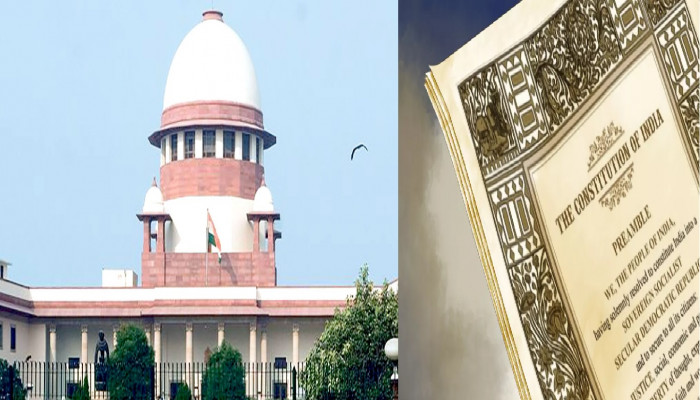SC upholds inclusion of 'Socialist' and 'Secular' in constitution's preamble, dimisses petitions challenging it
- In Reports
- 03:24 PM, Nov 25, 2024
- Myind Staff
The Supreme Court on Monday dismissed petitions challenging the incorporation of the words “socialist” and “secular” into the Preamble of the Constitution through the 42nd Constitutional Amendment of 1976.
A bench led by Chief Justice of India Sanjiv Khanna, along with Justice PV Sanjay Kumar, affirmed Parliament's authority under Article 368 to amend the Constitution, provided such amendments do not violate its basic structure. The court ruled that the inclusion of these terms does not conflict with constitutional principles.
“The fact that the Constitution was adopted and actively given to themselves by the people of India on November 26, 1949, does not make any difference. The date of the adoption would not curtail or restrict the power under Article 368,” Chief Justice Khanna stated, delivering the operative part of the judgment. The full verdict is awaited.
The petitions, filed by former BJP MP Subramanian Swamy, advocate Ashwini Upadhyay, and social worker Balram Singh, argued that the framers of the Constitution intentionally excluded these terms during Constituent Assembly debates. They also questioned the legitimacy of the 1976 Parliament, which functioned during the Emergency and under an extended tenure.
Advocate Vishnu Shankar Jain, representing Singh, contended that the Lok Sabha’s tenure was extended solely to address emergency needs and not to amend the Constitution. “Adding these words without public consultation distorted the original intent of the framers,” Jain argued.
Swamy suggested that these terms be explicitly acknowledged as later additions rather than being implied as part of the original text. Upadhyay clarified that his objection was to the process of inclusion during the Emergency, which he termed “illegal,” rather than the concepts of socialism or secularism themselves.
Rejecting these arguments, the bench reiterated that Parliament's power to amend the Constitution extends to the Preamble and noted that the 42nd Amendment has undergone extensive judicial scrutiny over decades.
The court emphasised the contextual meaning of socialism in India, describing it as promoting equitable resource distribution and opportunity without hindering private enterprise. On secularism, the bench highlighted its Indian interpretation, rooted in equal respect for all religions, citing the landmark SR Bommai case (1994), which declared secularism a part of the Constitution's basic structure.
Addressing concerns about the Emergency-era Parliament’s legitimacy, the court remarked, “Legislative actions taken during the Emergency cannot be annulled solely because they were enacted under an extended Lok Sabha.”
This decision reinforces the constitutional validity of the 42nd Amendment and Parliament's legislative authority.







Comments